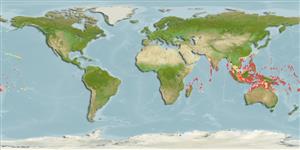Environment: milieu / climate zone / depth range / distribution range
البيئة
بحري مرتبطة بالشعاب; غير مهاجرة; نطاق العمق 0 - 40 m (Ref. 9710), usually 3 - 20 m (Ref. 37816). Tropical; 31°N - 20°S, 40°E - 148°W (Ref. 5222)
Indo-Pacific: East Africa (but not the Red Sea, Persian Gulf or South Africa) to the Society Islands, north to the Ryukyu Islands, south to northern Australia. Including most islands of the Indian Ocean and that of the west-central Pacific (Ref. 5222). Record from Rodriguez by Heemstra & Randall (1984, Ref. 3153) could not be verified and is probably erroneous (Ref. 33390).
الحجم / وزن / العمر
Maturity: Lm ? range ? - ? cm
Max length : 24.0 cm TL ذكر/ مختلط الجنس; (Ref. 9710); أعلا وزن تم نشرة: 35.64 g (Ref. 124708)
الأشواك الظهرية (المجموع) : 9; الأشعة الظهرية الناعمة (المجموع) : 13 - 15; شوكة شرجية: 3; أشعه شرجية لينه: 9 - 10. Resembles C. urodeta, but always has a distinctive dark saddle on caudal peduncle (Ref. 37816); characterized further by reddish brown head with numerous red-orange or pinkish red spots, extending to pectoral region; mottled pinkish brown body; upper caudal-fin base with large dark brown saddle with smaller saddle just behind; upper part of caudal fin with dark brown streak, less intense streak on lower part; ctenoid scales on body including abdomen; greatest depth of body 2.6-2.9 in SL; rounded caudal fin; pelvic fins, 2.0-2.3 in head length (Ref. 90102).
Occurs in coral-rich areas of lagoon pinnacles, channels, and outer reef slopes. Solitary (Ref. 37816), a secretive species, usually hiding in caves and crevices in the reefs. One of the smallest species of groupers known. Omnivorous with diet composed of fishes and crustaceans; relatively low egg production per individual (Ref. 089707). Minimum depth reported taken from Ref. 128797.
Life cycle and mating behavior
Maturities | التكاثر | Spawnings | Egg(s) | Fecundities | Larvae
Heemstra, P.C. and J.E. Randall, 1993. FAO Species Catalogue. Vol. 16. Groupers of the world (family Serranidae, subfamily Epinephelinae). An annotated and illustrated catalogue of the grouper, rockcod, hind, coral grouper and lyretail species known to date. Rome: FAO. FAO Fish. Synop. 125(16):382 p. (Ref. 5222)
IUCN Red List Status (Ref. 130435)
استخدامات بشرية
مصائد: غير مهمة تجارياً
أدوات
تقارير خاصة
Download XML
مصادر علي الأنترنت
Estimates based on models
Preferred temperature (Ref.
123201): 26.6 - 29, mean 28.1 °C (based on 550 cells).
Phylogenetic diversity index (Ref.
82804): PD
50 = 0.5000 [Uniqueness, from 0.5 = low to 2.0 = high].
Bayesian length-weight: a=0.01259 (0.00590 - 0.02687), b=3.04 (2.87 - 3.21), in cm total length, based on LWR estimates for this Genus-body shape (Ref.
93245).
مستوى غذائي (Ref.
69278): 4.0 ±0.66 se; based on food items.
المرونه (Ref.
120179): عالي, الحد الزمني الأدني لتضاعف عدد أفراد المجتمع أقل من 15 شهر (Preliminary K or Fecundity.).
Fishing Vulnerability (Ref.
59153): Low vulnerability (14 of 100).
Nutrients (Ref.
124155): Calcium = 66.8 [36.6, 120.8] mg/100g; Iron = 0.566 [0.306, 1.088] mg/100g; Protein = 18.6 [16.8, 20.2] %; Omega3 = 0.176 [0.106, 0.290] g/100g; Selenium = 31.5 [14.7, 56.2] μg/100g; VitaminA = 126 [43, 400] μg/100g; Zinc = 0.979 [0.689, 1.621] mg/100g (wet weight);
